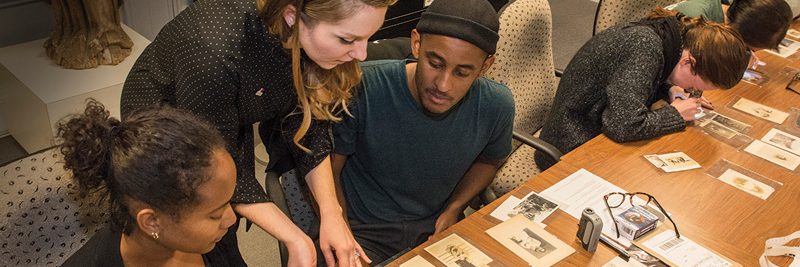
Graduate Strategic Plan: Graduate and Postdoctoral Research, Scholarship and Creative Expression

The Graduate College will enhance graduate experiences by supporting, developing and enhancing opportunities for graduate and postdoctoral research, scholarship and creative expression.
Objective 1: Use discretionary research funds (e.g., fellowships and awards) to advance the aims of the Graduate College. These aims include:
- Removing barriers to DEI.
- Promoting interdisciplinary activities.
- Supporting terminal master’s on par with doctoral programs.
- Partnering with funding agencies to pursue training grants.
Objective 2: Leverage student retention data and best practices so that our students thrive intellectually and attain access to their professional aspirations.
Objective 3: Establish informed Graduate College recruitment goals for the entire University that:
- Develop goals based on U.S. and global graduate enrollment trends, costs and projections as well as market demands.
- Maintain a sustainable balance between master’s, terminal master’s, doctoral and certificate programs.
- Account for existing capacity and other strategic interests at UD.
- Incorporate a healthy strategy that includes internal recruitment where appropriate.
- Incorporate a diverse, robust and pragmatic international strategy.
- Build graduate cohorts that include domestic graduate demographics that are similar to those of the United States.
- Build international graduate demographics that are similar to those worldwide.
Objective 4: Develop a robust University-wide marketing and recruitment strategy that:
- Achieves the Graduate College recruitment goals.
- Recruits UD undergraduates in a systematic way by providing a “one-stop” mechanism, such as a Graduate Program Fair for UD undergraduates and those at selected colleges in our region to learn about UD’s graduate programs.
- Distinguishes between internal and external recruiting and includes plans for each.
- Works harmoniously with other colleges.
- Develops pipelines from UD summer programs.
- Clearly articulates what distinguishes UD graduate education.
Immediate (AY21-22):
- Objectives 1-4 - Clearly articulate the purposes, processes and policies underlying all Graduate College-funded awards, fellowships and tuition waivers.
- Objective 1 - Develop policies for reallocating assets in the support of external training grants (e.g., matching and cost-shares).
- Objective 2 - Review all Graduate College-funded awards, fellowships and tuition waiver programs for barriers, unstated expectations, redundancy and opacity.
- Objective 3 - Launch a pilot for the Graduate and Postdoc Frontier program
- Objective 4 - Form a standing Graduate Research Forum Committee consisting of students, faculty and staff. The committee’s mission is to plan and execute the Graduate Research Forum.
Mid-Term (AY21-22 through AY23-AY24):
- Objective 1 - Provide opportunities for faculty members to interact with and recruit graduate students and postdoctoral scholars from all populations, especially underrepresented groups and international. (Also advances objectives in Recruitment and Retention.)
- Objective 1-2 - Create a single Graduate and Postdoc Research Guide for graduate students and postdocs, which includes sponsored fellowships, research facilities, key offices and research training workshops.
- Objective 2 - Provide promising practices on successful recruitment and retention of mentees from underrepresented groups or international populations. (Also advances objectives in Recruitment and Retention.)
- Objective 2 - Provide Center for the Improvement of Mentored Experiences in Research (CIMER) training for faculty and postdocs.
- Objective 2-4 - Create new opportunities for interdisciplinary research and amplify existing ones.
Long-Term (AY21-22 through AY25-AY26):
- Objective 1 - Create a seed fund for independent, collaborative graduate student and postdoc endeavors.
- Objective 2 - Provide training opportunities for faculty, postdoctoral scholars and graduate students focused on building successful research groups.
- Objective 2 - Develop communities of practice for faculty members who have graduate students and postdoctoral scholars from underrepresented populations to support their ability to serve as quality mentors for those researchers.
- Objective 2 - Identify appropriate incentives to encourage participation in research mentor training workshops and continued implementation of positive mentoring practices.
- Objectives 2-4 - Create new opportunities for interdisciplinary research and amplify existing ones.
- Objective 3 - Seek opportunities to involve graduate students in faculty early-career opportunities (e.g., proposal writing workshops and other offerings).
- Objective 4 - Explore ways to invigorate Graduate Student Research Forum, including involving deeper involvement from colleges and alumni.
- Outputs from action items.
- Numbers of large training grants (T32, T99, NRT, LSAMP BtD, AGEP, etc.) and sponsored training projects submitted/awarded.
- Interdisciplinary research activity. Aligns with draft UD strategic plan around interdisciplinary activity.
- Research participation by demographics and disciplines measured by fellowships awarded and UD research expenditures.
- Philanthropy supporting graduate stipends.
- Number of faculty on campus receiving research mentorship training broken out by faculty rank.
